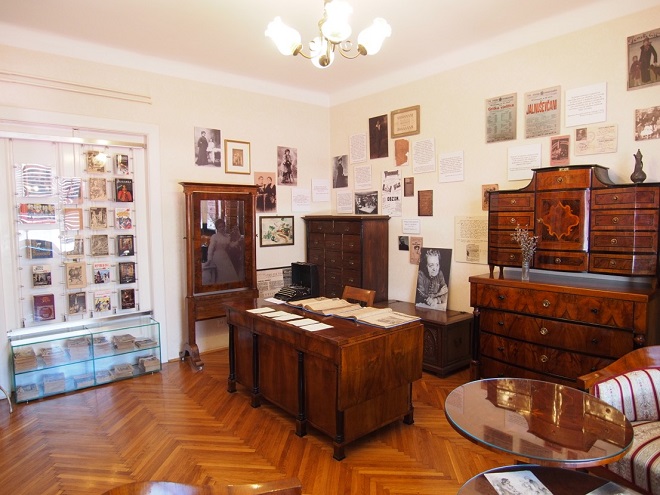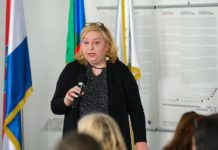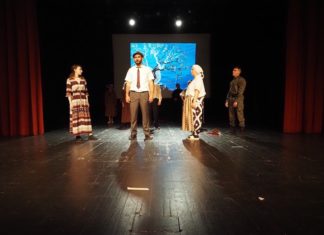Centre for Women’s Studies, founded by a group of feminists, theorists and scholars, peace activists and artists in 1995 is the first non-institutional educational centre in Croatia. The program offers an insight into the diverse themes of feminism and gender studies, women’s culture and history, women’s rights and gender equality.
The curriculum for women’s studies has been constantly changing and upgrading, and there have been numerous courses on the women’s achievements through history, including prominent members of national minorities, tells us Karolina Hrga, Executive Director of the Centre for Women’s Studies. Furthermore she explains: However, through our program, we strive to map historically the socio-economic and political context of oppression and exploitation, rather than insisting on the achievements of individual women, which can easily be co-opted by a neoliberal ideology that says we are guilty and worthy of our own achievements and failures and that our gender , sexuality, ethnicity, class, etc., have little to do with it. Therefore, through our modules (including: Feminist Critique of Violence, Women and the Welfare State, Socio-economic Context of Contemporary Feminist Struggles, Lesbian Studies, Queer Studies, Feminist Optics of Cultural and Artistic Practices, Feminist Critique of the National State and Capitalism, etc.) we primarily indicate the importance of thinking critically about the systemic forces in the world around us, and the need for politicised and engaged reflection and action.
Since 1999, the Centre has been organising an international postgraduate course at the Inter University Centre Dubrovnik (IUC), and in cooperation with the Department of Comparative Literature – Faculty of Humanities and Social Sciences, it organises Marija Jurić Zagorka Days annually. Also, in order to stimulate research within the academic community that focuses on gender issues and gender equality, since 2009 they have been granting the Award for Best Student Work. The goal of this Award is to encourage interest and develop sensitivity for the aforementioned topics within the academic community, so one of the three persons awarded in 2019 is this year’s student of the women’s study program, says Karolina Hrga, and adds: She is the student of Social Pedagogy at the Faculty of Education and Rehabilitation Studies, University of Zagreb, with the work entitled Gender Roles in Rroma Communities: The Experiences of Rroma Women.
The Centre also holds programs for the education of women on various aspects of discrimination and ways to combat it. For more than two decades, the Centre has organised various educational programs for different social groups, for example, attendants of the project seminar Gender, Minorities, Citizenship / Nationality were also members of different minorities, mostly from smaller, rural areas, including the members of Rromani community, emphasised Karolina Hrga adding: Besides, one of the recent topics of the One Billion Risingcampaign, jointly organised with the Centre also focused on discrimination against Rroma women, and in fact several Rroma women, members of civil society organisations from Zagreb and Sisak, actively joined the campaign. The Centre is aware of the far broader context affecting the status of the Rroma, which involves the implementation of economic, social, political and other measures aimed at more transformative and far-reaching positive effects: We need to think about interventions and changes at the level of strengthening economic redistribution, ie social transfers , and thus necessarily at the level of a different conception of productive relationships, as well as of the social reproduction that sustains them, which is further burdensome for women in minority communities. The path to the realisation of such a project also partly leads through the construction of solidarist parallel structures, as a basis for political activation and a temporary solution for the existentially disadvantaged majority, as well as oppressed minorities, who are mostly in equally unenviable or even worse material situation.
The structure of the students of the women’s study program is very diverse, as Karolina Hrga said, it is heterogeneous, that is, gender, class and ethnic variable and related to minority communities attendees she added: Although members of the minority communities are still at a small percentage represented at our courses, for example, last year we had students of Serbian, Bosnian and Albanian ethnicity. In times when Women’s Studies disposed with more adequate resources, we used to organise study visits, so a Rroma woman from Macedonia also attended the program.

As indicative of the students class position, Karolina Hrga mentions an example of an anonymous survey conducted by the Centre as part of last year’s study program:Anonymous survey conducted to solicit information about the socio-economic status of our students, was carried out among 80 percent of enrolled students, of whom 80 percent are between 20 and 30 years old. Of those surveyed, 71% participated in the labour market, but only 32% were part-time and full-time employees. 68% were tenants, while 42% were dependent on their families when it came to paying for housing costs, and an additional 16% shared the cost of housing with their current or former partner. So, these statistics already suggest that a growing number of people deals with the risks of basic existence and that the emancipation of those who are in the most difficult position today; minorities, LGBTIQ+ persons, women, migrants, will have to be fought at the systemic level, understanding the logic behind the institutionalised mechanisms and regimes of oppression produced and reproduced by the capitalist system of production. Therefore, the key emphasis of our women’s study program is precisely the education, politicisation and critical consideration of systemic production of inequality, unequal distribution of goods and discriminatory practices that the oppressed groups suffer in our societies, primarily gender, sexual, ethnic, racial and other minorities.
The Executive Director of the Centre for Women’s Studies also answered a question about cooperation with Rromani associations regarding joint action aimed at empowering women in political and civic initiatives: I believe in future we will have the opportunity to cooperate with Rromani organisations on educational feminist projects directed towards politicising, empowering, and self-organising the individuals involved, who will later implement these emancipatory models and practices in their organisations and communities. Financial undercapacity and precarisation of progressive civil society organisations has certainly weakened the reach of their activities, but it should also be borne in mind that the collapse of the welfare state and its public services, which we have witnessed in recent decades, cannot be adequately compensated by small, one-off, bureaucratic and administratively burdened European projects intended for civil society organisations, which the state uses to cover its own systemic disregard for the needs of disadvantaged groups as well as the exploited working majority, in short, 99% of the population. Also, it is important to note that minority inclusion policies adopted by states should generally be more democratic and more successfully address and solve the needs of those most disadvantaged within minority communities, from access to education, healthcare to the roof over their head and inclusion in the labour market.
Centre for Women’s Studies has also been involved in activities carried out during the month of March this year, aimed at commemorating the historic struggle of women for equality and their achievements. Karolina Hrga points out that the activities are carried out throughout the year: On March 8, we supported the Night March and coorganised a panel dedicated to the women’s strike and the crisis of social reproduction, ie possible ways of broader politicisation of the feminist struggle, together with the feminist collective fAKTIV. At the same time, we systematically educate staff and new young people throughout the year, considering and reflecting on potential feminist methods and practices that will make feminism a mobilising element of the anticapitalist struggle.
Since 2009, the Centre for Women’s Studies has been managing the Marija Jurić Zagorka Memorial Apartment at the address Dolac 8, where she lived from the mid-1930s of the 20th century until her death.












